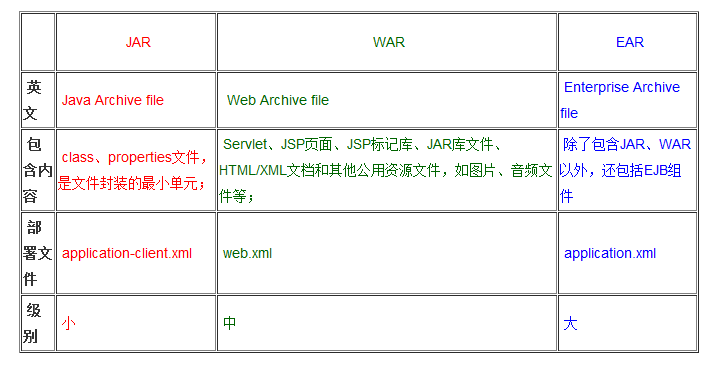.jar/war/ear包的区别
以最终客户的角度来看,.jar文件就是一种封装,他们不需要知道.jar文件中有多少个.class文件,每个文件中的功能与作用,同样可以得到他们希望的结果。除jar以外对于J2EE来说还有war和ear。区别见下表:
[img]
[/img]
经常在我们Java Web项目中看到jar/war/ear这几种文件类型,它们之间有何不同之处呢?我查了一些资料归纳整理如下:
jar/war /ear三种文件,在文件结构上,三者并没有什么不同,它们都采用zip或jar档案文件压缩格式。但是它们的使用目的有所区别:
Jar文件(扩展名为. Jar)包含Java类的普通库、资源(resources)、辅助文件 (auxiliary files)等
War文件(扩展名为.War)包含全部Web应用程序。在这种情形下,一个Web应用程序被定义为单独的 一组文件、类和资源,用户可以对jar文件进行封装,并把它作为小型服务程序(servlet)来访问。
Ear文件(扩展名为.Ear)包含全部企业应用程序。在这种情形下,一个企业应用程序被定义为多个jar 文件、资源、类和Web应用程序的集合。
每一种文件(.jar, .war, .ear)只能分别由应用服务器(application servers)、小型服务程序容器(servlet containers)、EJB容器(EJB containers)等进行处理。
JAR WAR EAR
英文 Java Archive file ; Web Archive file Enterprise Archive file
jar:包含内容 class、properties文件,是文件封装的最小单元; war:Servlet、JSP页面、JSP标记库、JAR库文件、HTML/XML文档和其他公用资源文件,如图片、音频文件等;ear:除了包含 JAR、WAR以外,还包括EJB组件
部署文件 application-client.xml web.xml application.xml
级别 小 中 大
jar:封装类 war:封装web站点 ear:可以封装ejb
JAR: Software developers generally use .jar files to distribute Java applications or libraries, in the form. of classes and associated metadata and resources (text, images, etc.) JAR files build on the ZIP file format.
WAR: In computing, a WAR file (which stands for "web application archive" ) is a JAR file used to distribute a collection of JavaServer Pages, servlets, Java classes, XML files, tag libraries and static Web pages (HTML and related files) that together constitute a Web application.
EAR: An Enterprise ARchive, or EAR, is a file format used by Java EE for packaging one or more modules into a single archive so that the deployment of the various modules onto an application server happens simultaneously and coherently. It also contains XML files called deployment descriptors which describe how to deploy the modules. Maven or Ant can be used to build EAR files.
RAR: A Resource Adapter is an archive file format defined in the J2EE Connector Architecture (JCA) specification. A Resource Adapter aRchive (RAR) file is the valid format for deployment of resource adapters on application servers. J2EE RAR files may also be called connectors.
其他概念:
EJB: Enterprise JavaBeans (EJB) is a managed, server-side component architecture for modular construction of enterprise applications. The EJB specification is one of several Java APIs in the Java EE. EJB is a server-side model that encapsulates the business logic of an application.
JavaBean: JavaBeans are reusable software components for Java that can be manipulated visually in a builder tool. Practically, they are classes written in the Java programming language conforming to a particular convention. They are used to encapsulate many objects into a single object (the bean), so that they can be passed around as a single bean object instead of as multiple individual objects. A JavaBean is a Java Object that is serializable, has a nullary constructor, and allows access to properties using getter and setter methods.
Metadata: Metadata is a means to describe the data files.It provides information about a certain item's content, such as: means of creation, purpose of the data, time and date of creation, creator or author of data, placement on a network (electronic form) where the data was created, what standards used (ISO9000), etc.